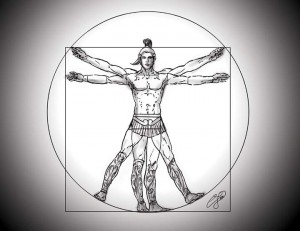Finding USC’s next Renaissance man
Last Wednesday, Professor of Polymathy Sidney Harman boldly proclaimed that he would “contaminate the entire university” at the inaugural event for the Academy of Polymathic Study.
The event marked the creation of one of the few institutions of polymathic study across the United States.
Polymaths are people who live the Renaissance ideal; They are proficient in many different fields, be it music, science, engineering, art, English, etc.
USC’s Academy seeks to bring together a collection of faculty and students to form a library-centered series of discussions “anchored in and structured by four Quadrants of Polymathic Inquiry, critical and integrative thinking, study of the great polymaths, tapestry, and communication.”
Students must apply to become Academy Fellows, and accepted students who successfully complete 10 meetings during their undergraduate study at USC are eligible for an Academy Certificate of Recognition.
Hopefully, by the program’s completion, students will be able to illuminate one field of study with the perspective of another.
“Our process of the metacognitive is essential to our successes,” Harman said Wednesday.
Academy Fellows will “review the manner, product, and thinking of the great polymaths.”
Polymaths such as Leonardo DaVinci, Albert Einstein and Johann Goethe were not only considered great within the specialties they originally pursued, but as Harman said, “the magic of their work was the way they synthesized and integrated [their] disciplines.”
The Academy is dedicated to engaging both the faculty and the students in an interactive activity to question orthodoxy through the integration of technology, art and philosophy.
Future events include a luncheon series on polymathy in research and conversations about “multiple realities through digital technology, theoretic physics and a polymathic approach to literature, cinema and cultural history.”
The events are open to all USC students, not just Academy Fellows, but, the task of improving outreach to students remains.
The news of the new Academy is currently spreading through the honors student circles through e-mails from the academic recognition program, Thematic Option, etc, and bypassing the majority of the university.
The awareness of the growing importance of integrated interdisciplinary studies is understood by all USC students, and the Academy should publicize its events with that in mind.
One avenue to advertise would be the interdisciplinary studies major.
Traditionally viewed as a piece-meal major with minimal career potential, it might prove relevant to solving current problems, as increased globalization has led to a need for expertise in more than one field alone.
USC has also pioneered several new majors that integrate several disciplines into a more coherent track of study.
Global health incorporates international relations, economics and health promotion and disease prevention.
Politics, law and society melds public policy, philosophy and political science. Health and humanity, narrative studies and bioethics all recognize the need for a broader view toward solving modern-day problems.
The Renaissance ideal receives special emphasis at USC through the Renaissance Scholar program, which recognizes USC students who have double majored or minored in disparate areas of study, such as chemical engineering and comparative literature.
USC also highly encourages picking up an extra minor or two, double majoring, double majoring with a minor, triple majoring or whatever ambitious derivative a student might desire.
This supportive atmosphere actually played a major role in my decision to attend USC, and, from conversations with other students, apparently it held influence over other people’s choices as well.
The new Academy just serves as another piece of evidence that the USC student should be a well-rounded scholar whose explorations and interests ignore the arbitrary boundaries of academic fields of study.
Rebecca Gao is a freshman majoring in global health and biological sciences. Her column, “Trojan Grounds,” runs Mondays.

